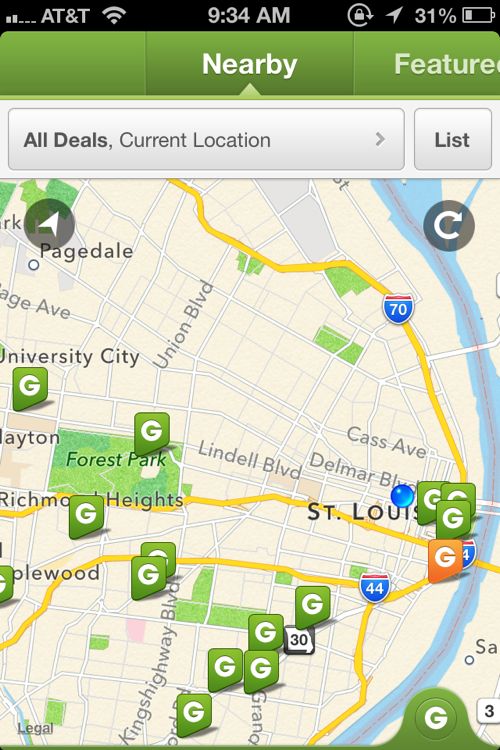Completely Different Economies
Many people use daily deal sites/apps like Living Social and Groupon and many local versions exist now as well. Businesses run deals in an attempt to attract new customers, but the distribution of deals is .

Recently looking at a map (above) of Groupon deal locations it become clear to me the central corridor and south city are my only options, no businesses in north city seem to be participating. A notable exception is advertiser Rambles on 14th Street in Old North had a recent deal on Living Social.
Perhaps the north city merchants realize the cost of a new customer through such sites may simply be too high, not enough bang for the buck. I looked on Ujamaa Deals but didn’t find anything local:
Ujamaa Deals was founded to directly combat the chronic unemployment plaguing the Black community. No community that spends over 90% of its money with businesses that they don’t own will EVER achieve political, social, cultural, or economic equality or independence!
The idea behind Ujamaa Deals is very simple. The real unemployment rate in the Black community is over 20%, with some estimates as high as 30%, and these numbers are not improving. It is a fact that Black-owned business are more likely to hire Black people than non-Black-owned businesses (about 85% more likely actually). Blacks currently spend less than 10% of their money with Black-owned businesses. So it became obvious to us that the most efficient way to combat Black unemployment is to re-direct more Black dollars to Black businesses in order to help them grow, and when they grow they’ll need to hire more people, and those people are likely to be Black. So by spending money with Black-owned businesses we are creating wealth and jobs for ourselves and decreasing our dependence on others for goods and services.
One sentence really stood out to me:
“Blacks currently spend less than 10% of their money with
Black-owned businesses.”
That’s a harsh reality if true! Looking into this issue I ran across an article by Ujamaa Deals co-founder Lawrence Watkins where he discussed the 4 half-truths about black-owned businesses — and why you should still buy black:
- Customer service is terrible with black-owned businesses.
- The prices of black-owned businesses are higher than at other firms.
- Encouraging people to buy black is racist. We need to encourage people to buy American.
- There aren’t any black products that I really want to buy.
Obviously much work needs to be done to get a thriving economy is predominantly black areas. I don’t have any solutions, do you?
— Steve Patterson
This will sound either obvious or condescending, but it boils down to more disposable income and less crime. The vast majority of retailers are color blind / see only one color, green. If the choice comes down to opening a store in a poor area or in a wealthier area, the vast majority of retailers, be they white, black, brown or yellow, are going to choose the area where there’s more money floating around. Add in the unfortunate parallels between crime and poverty, and most retailers will choose “safer” areas, ones where shoplifting is less of a problem, bars and bullet-proof glass are less of a need and employees are less likely to be robbed or shot.
However, the real reason that “blacks spend less than 10% of their money with black-owned businesses” is that less than 10% of all businesses are owned by minorities – it’s an access-to-capital issue, not a geography issue! Most of us are clueless about “who” actually owns most of the businesses that most of us patronize. It’s either some faceless corporation or we assume it’ll be some local, “colorless”, businessperson / entrepreneur. If a store has what I want, I spend my money there, case closed. I really don’t care about the owner’s/owners’ ethnicity. And the stores that get my repeat business get it by offering good service, good products, fair prices and, yes, decent parking
Blacks in North St. Louis have less money and do less shopping via computer networks.
Groupon follows the money. How many North Side businesses are destinations for people in the rest of the Metro compared to the South Side? Not many. This is economics not racial prejudice.